You can effectively preserve food using five natural clove methods. Start with clove-infused oil, combining organic cloves with cold-pressed olive oil for a month-long preservation solution. Try whole clove pickling with vinegar and spices for several months of storage. Ground clove powder, when properly stored in airtight containers, keeps foods fresh while adding flavor. Spiced clove brine offers a versatile preservation technique using salt, sugar, and whole cloves. Finally, create antimicrobial clove syrup for protecting desserts and beverages. Each method taps into clove's powerful natural compounds, and there's much more to discover about these preservation techniques.
Clove-Infused Oil Preservation Method
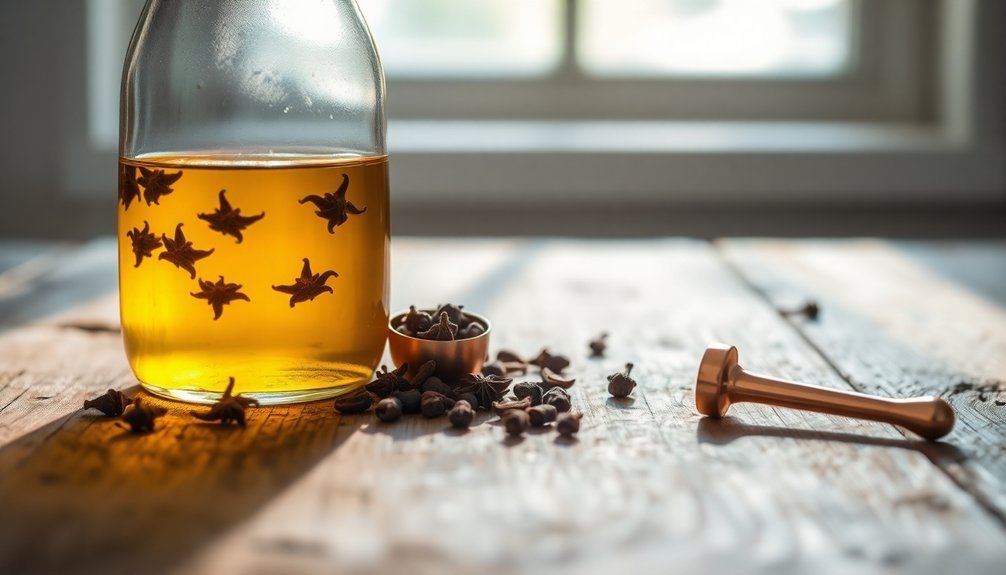
Three key components make clove-infused oil an effective preservation method: high-quality ingredients, proper infusion techniques, and careful storage.
When selecting ingredients, you'll want to use organic, whole cloves that are plump and brown, paired with extra virgin cold-pressed olive oil that offers a fruity, peppery taste.
You can infuse your oil using either the gentle heat method or sun infusion technique. For the heat method, warm (don't boil) the olive oil before pouring it over submerged cloves in a sterilized glass container. This method has proven especially effective at reducing food waste through its superior preservation capabilities.
Alternatively, you can place your clove-studded oil in a sunny spot for 1-2 weeks to develop flavors gradually.
Your infused oil's effectiveness relies heavily on proper storage. Keep it in a cool, dark place, away from direct sunlight and heat sources.
When stored correctly, it'll last up to a month. The oil's preservation power comes from clove's natural antimicrobial and antioxidant properties.
The eugenol in cloves fights against candida and staph infections, while its antioxidant activity helps control lipid oxidation and maintains nutrient integrity.
Whole Clove Pickling
Pickling with whole cloves offers up to several months of food preservation while infusing vegetables and garlic with rich, complex flavors.
When you're working with garlic, you'll need to start by blanching the cloves in boiling water for one minute, then shocking them in ice water to make peeling easier. If you're short on time, you can opt for pre-peeled garlic instead.
Your pickling brine should combine white vinegar or white wine vinegar with sugar, salt, and your chosen spices. For optimal flavor, add 1 tablespoon of sugar to balance the acidity. You'll want to include dried oregano, chili peppers, mustard seeds, and coriander seeds for a well-rounded flavor profile.
Bring your brine to a boil in a stainless steel pot, stirring until the sugar and salt dissolve completely.
Once your brine is ready, cook the garlic cloves for an additional minute before packing them into clean jars. Leave a ½-inch headspace and remove any air bubbles.
For long-term storage, process your jars in a water bath for 10 minutes at a rolling boil. You can store properly sealed jars in a cool, dry place, or keep non-processed pickles in the refrigerator for up to a week.
Clove Powder Storage Solution
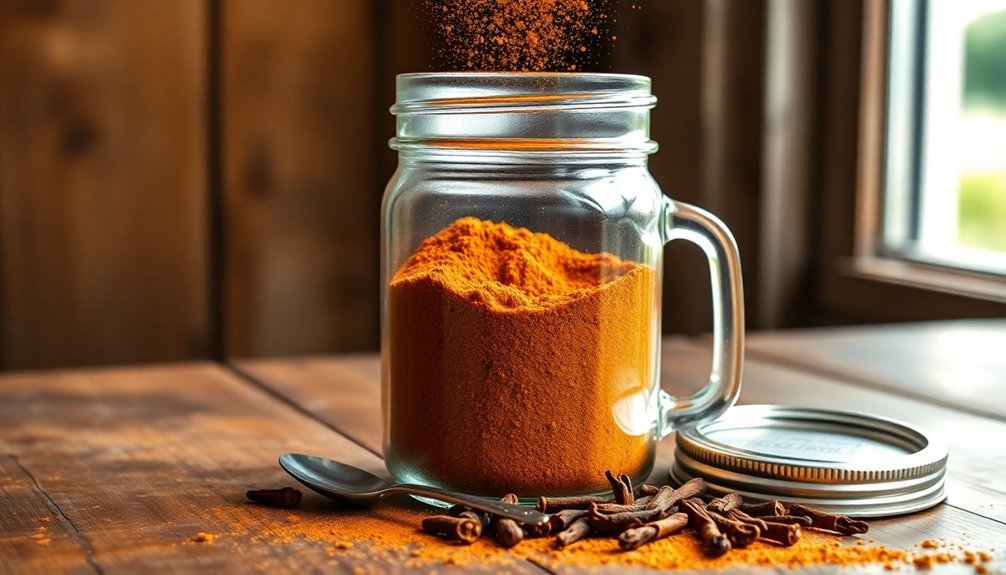
While whole cloves work well for pickling, ground clove powder needs specific storage methods to maintain its potent flavor and aromatic compounds. Freshly ground options provide maximum potency and flavor.
You'll want to store your clove powder in airtight, opaque containers to protect it from both oxygen and light damage. The ideal storage temperature ranges from 60-70°F (15-21°C), and you should keep the relative humidity below 60%.
To prevent moisture damage, which can lead to clumping and mold growth, you'll need to be vigilant about moisture control. Add silica gel packets to your storage containers and check regularly for any signs of moisture damage, such as clumping or musty odors.
When measuring your clove powder, avoid introducing moisture from steam or wet utensils.
For long-term storage, you've got two effective options. You can vacuum-seal the powder in containers that match its volume, minimizing air exposure, or use the freezing method.
If you choose to freeze, transfer the powder to an airtight, freezer-safe container, remove excess air, and store at 0°F (-18°C) or below. When properly frozen, your clove powder can maintain its quality for up to 3-4 years.
Spiced Clove Brine
Creating a spiced clove brine requires careful attention to both ingredients and proportions for ideal preservation. You'll need to combine salt, sugar, and whole cloves with your choice of liquid base, maintaining a ratio of ½ cup each of kosher salt and brown sugar per 8 cups of liquid.
| Component | Instructions |
|---|---|
| Base Mix | Combine water/juice with salt and sugar |
| Cloves | Add 8-10 whole cloves per quart |
| Temperature | Bring to boil, cool to below 40°F |
| Container | Use non-reactive vessel that fits refrigerator |
| Monitoring | Check temperature every 4-6 hours |
Once you've prepared your brine, you'll need to maintain strict temperature control throughout the process. Keep your food completely submerged using food-safe weights, and store the container in your refrigerator. If you're using a cooler method, surround the container with ice packs to maintain the temperature below 40°F.
Don't forget to turn your food occasionally for even distribution of the clove-spiced brine. After brining is complete (6-24 hours depending on size), rinse your food thoroughly and pat it dry before proceeding with your preferred cooking method.
Clove Syrup Food Protection
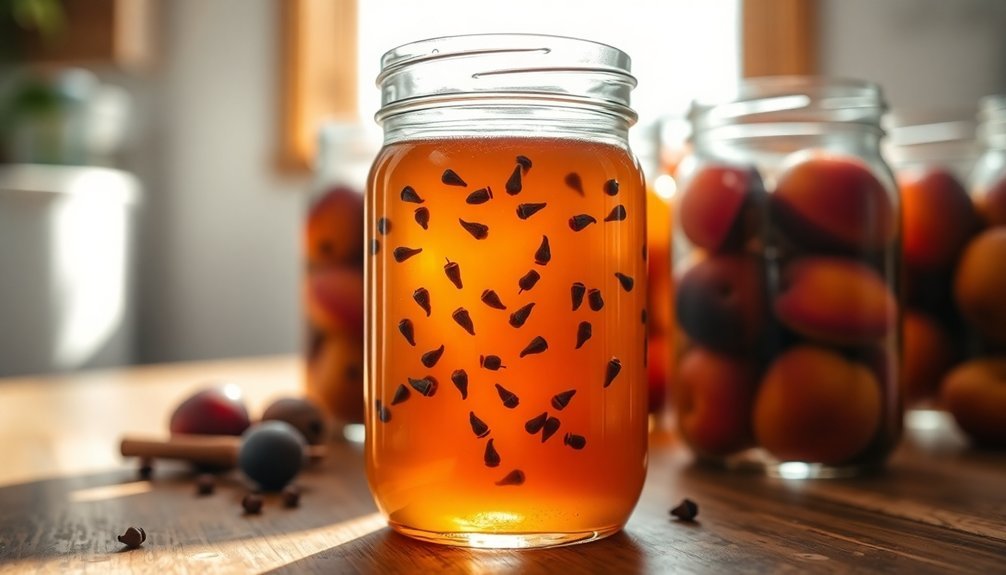
Beyond brining, clove syrup offers another effective method for preserving food. You'll find that combining unrefined sugar, water, and cloves creates a potent antimicrobial syrup that helps protect your culinary creations. The natural compounds in cloves work to kill microorganisms while adding a distinctive flavor to your preserved foods.
To make this protective syrup, you'll need to combine the ingredients in a saucepan, bring them close to a boil while stirring, then simmer for 20 minutes. Once cooled and strained, you can store your clove syrup in the refrigerator for up to two weeks.
- A clean swing-top bottle filled with dark amber syrup
- Tiny dark cloves suspended in the syrup before straining
- Crystal-clear strained syrup ready for use
You can use this preservation method in various ways, from enhancing tiki drinks to protecting desserts. The syrup's effectiveness comes from cloves' natural antimicrobial properties, which are safer than synthetic preservatives.
When you're looking to extend the shelf life of your food products, remember that clove syrup can work alone or in combination with other natural preservatives for enhanced protection.
Frequently Asked Questions
Can Cloves Be Combined With Other Spices for Enhanced Preservation Effects?
Yes, you'll get enhanced antimicrobial effects when you combine cloves with cinnamon, allspice, and mustard seeds. These spice combinations work together to improve food preservation while adding delicious flavors to your preserved foods.
How Long Do Clove-Preserved Foods Maintain Their Original Nutritional Value?
You'll find that clove-preserved foods maintain most of their nutritional value for up to one year. After that, nutrients gradually decline, though proper storage at consistent temperatures helps retain more nutrients longer.
Are There Any Foods That Should Not Be Preserved Using Cloves?
You shouldn't preserve delicate foods like fish, dairy, soft fruits, and leafy greens with cloves. They'll overpower mild flavors and can be incompatible with high-moisture foods or those requiring refrigeration.
What Is the Maximum Temperature for Clove Preservation Methods to Remain Effective?
You'll want to keep temperatures below 70°F (21°C) for ideal clove storage. Don't exceed 140°F (60°C) during dehydration, and remember that higher temperatures will quickly degrade the essential oils and flavor.
Does the Strength of Clove Flavor Increase During Long-Term Food Preservation?
You'll notice that clove flavor actually diminishes over time during preservation. While it's still effective as a preservative, the intense flavor peaks early and gradually becomes milder during long-term storage periods.
In Summary
You've now learned five powerful ways to use cloves as a natural food preservative. Whether you're making infused oils, pickling with whole cloves, using clove powder, creating spiced brines, or preparing protective syrups, you'll find these methods both effective and chemical-free. Try incorporating these techniques into your food preservation routine, and you'll enjoy longer-lasting, naturally preserved foods with the added benefit of clove's rich, aromatic flavor.
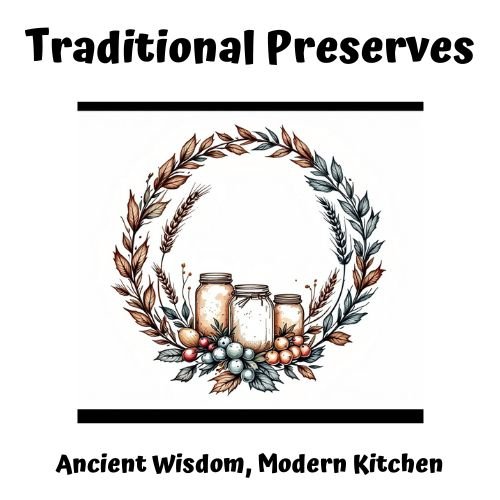
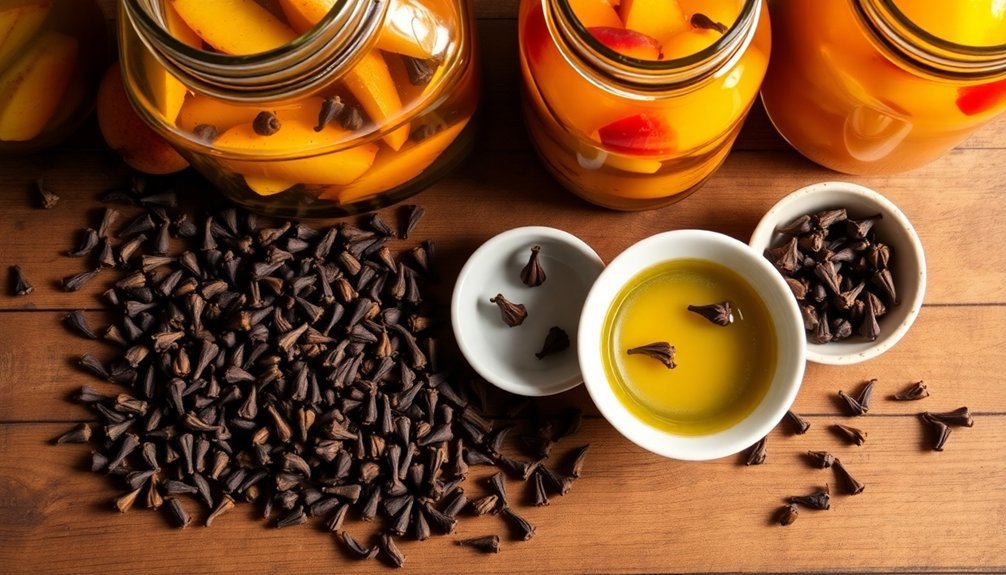
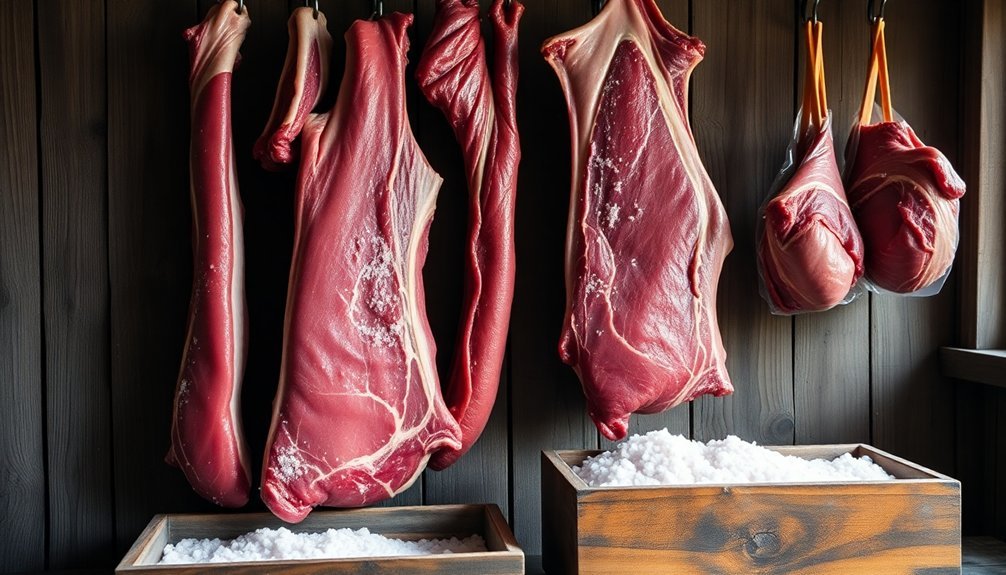
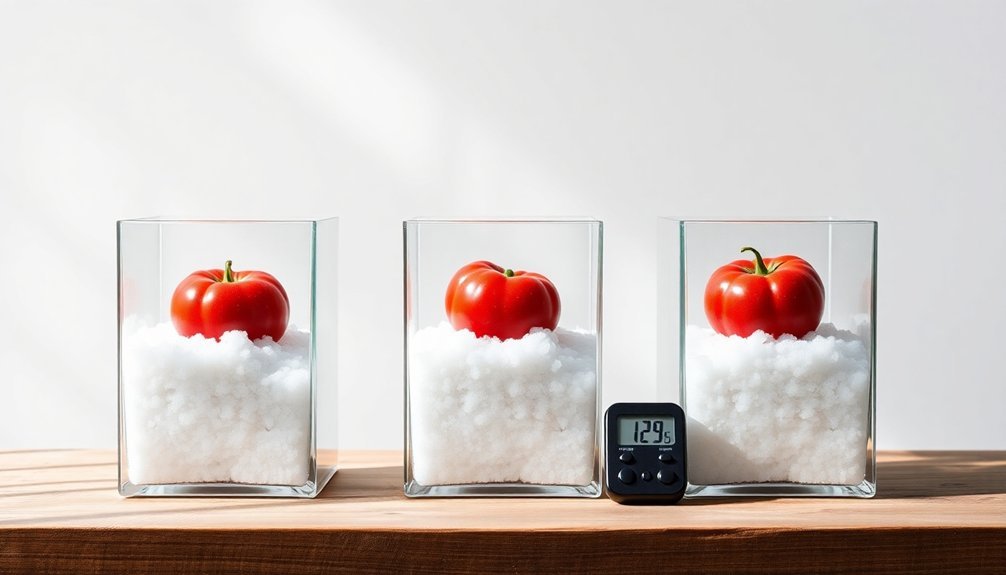
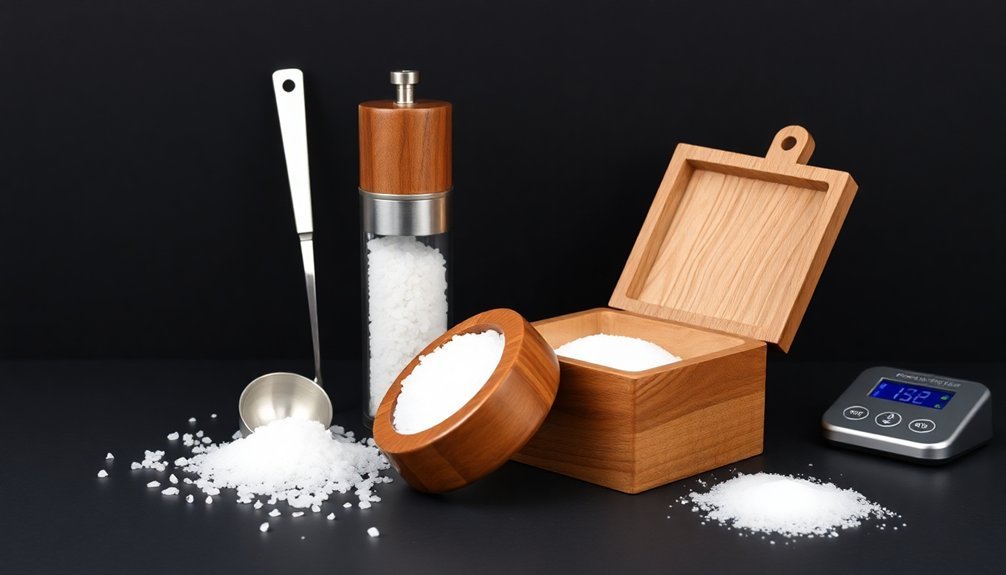
Leave a Reply